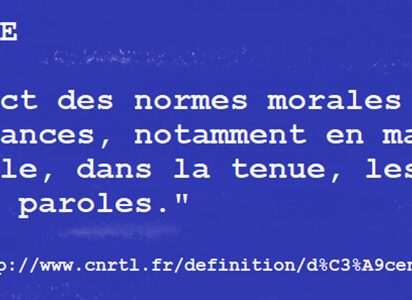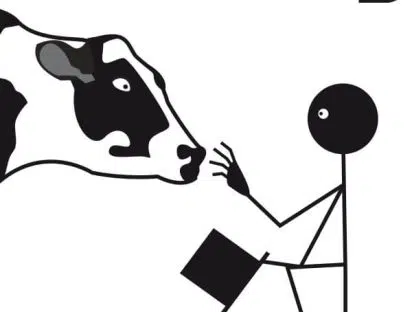In a recent interview, the French Judge Edouard Durand stated, with regard to the public testimony of victims of incest and sexual violence: “I do not see what moral imperative could prevent victims of violence from saying so by whatever the means they choose” (1). This statement, which is relevant, does not exclude the fact that public speaking is governed by an imperative of prudence. But this practical imperative is not unrelated to morality.
1.
The prudence of common sense
When discussing how prudence governs freedom of expression, we sometimes think of the example proposed by John Stuart Mill. Mill defended freedom of speech as a means of seeking and discovering the truth, but conceived that it could, in certain circumstances, cause harm to others in the same way that an action does (2). Thus, a person whose opinion is that “corn-dealers are starvers of the poor” may rightly state it in the press, but it would be imprudent and wrong to express it “to an excited mob assembled before the house of a corn-dealer” (3).
In the sentence we quoted in the introduction, Judge Edouard Durand did not need to mention prudence. Deliberating before acting, anticipating the consequences of several options, calculating and comparing advantages and disadvantages are practices approved and encouraged by common sense, that “way of judging [and] acting [which is] common to all reasonable men” (4). These qualities are those of prudence in the ordinary sense of the word. It is indeed the characteristic “of one who acts with intelligence and moderation so as to avoid anything that may cause harm” (5).
Although prudence has a “modest and instrumental” character, in the words of André Comte-Sponville – it is concerned with the means to achieve goals that it does not itself determine (6) – it can refer to an ideal of conduct. Odysseus is an example of this. For instance, Allan Bloom, commenting on Shakespeare’s Odysseus in his play Troilus and Cressida, which features heroes from antiquity, says of him that “he is the only one with a general awareness of the whole situation and with plans to change it” (7). “A general awareness of the whole situation” refers to the perceptive dimension of prudence: it concerns action, but before acting, one must, as Aristotle says, have knowledge of the particular facts, or particulars, and perceive what is right and wrong for persons concerned in a given situation (8).
2.
The imperative of prudence according to Kant
There are different conceptions of prudence, but Judge Edouard Durand’s statement – “I do not see what moral imperative could prevent people who are victims of violence from saying so by whatever means they choose” – is similar to the allusion to conception proposed by Immanuel Kant.
There are two reasons for this. First, the term “moral imperative” seems to refer to his conception, which is based on the imperative of morality, more precisely the categorical imperative. Secondly, Kant excludes prudence from the realm of morality – “Kant banishes it from morality, because its imperative was only hypothetical,” in the words of Pierre Aubenque (9). Naturally, Judge Edouard Durand’s statement does not claim to adhere to Kant’s vision, but it does allude to it indirectly.
Kant defines prudence as “skill in the choice of means to one’s own greatest well-being” (10). For Kant, it is not a virtue as conceived by the ancient Greek and Latin philosophers, but a particular case of skill, in the words of Pierre Aubenque. It nonetheless acts as an imperative, a commandment that is imposed on the will.
Kant distinguishes between hypothetical imperatives and categorical imperatives. The former are called “hypothetical” because they depend on a goal that they aim to achieve, whereas categorical imperatives – or even better the categorical imperative – which is the imperative of morality, does not depend on any external goal, in the sense that the action it commands is “itself objectively necessary” (11). As Pierre Aubenque summarises:
“If the action that the imperative commands is good only as a means to something else, the imperative is hypothetical; if it is represented as good in itself, without relation to an end other than itself, the imperative is categorical” (12).
The imperative of prudence is one of the hypothetical imperatives. These command a large number of our choices. As soon as we pursue a goal, whatever that goal may be, we must choose the appropriate means. The function of the hypothetical imperatives is to guide the choice of these means.
Hypothetical imperatives fall into two categories, depending on whether the goals we are pursuing are possible or real. Most of the goals we pursue are contingent or possible: we can aim for this or that, depending on our inclinations and circumstances. The possibilities are infinite. In this case, our choices are guided by the “rules of skill.” These rules are indifferent to the nature of the ends pursued – skill is “morally neutral” (13):
“Whether the end is rational and good is not at all the question here, but only what one must do in order to attain it.” (14).
But there is an end that is common to all human beings, more precisely “that can be presupposed as actual in the case of all rational beings […], and therefore one purpose that they not merely could have but that we can safely presuppose they all actually do have by a natural necessity:” happiness (15). To pursue this goal, we do not resort to the rules of skill as we do for more material goals. We resort to the “counsels of prudence.” Here the end is fixed, it is “given” and responds to a “natural necessity” (16). If it does not have the neutrality of the ends that are aimed at by skill, it remains indeterminate, since the individual conception of happiness is subjective and depends on a number of conditions, and since it is impossible for anyone to have a precise representation of what the greatest happiness for oneself is:
“It is impossible for the most insightful and at the same time most powerful but still finite being to frame for himself a determinate concept of what he really wills here” (17).
It follows that, although the end it serves is real (happiness), prudence possesses neither the precision of skill, which serves to pursue well-identified ends, nor the character of necessity which is proper to moral rules. This is why it only gives advice:
“Imperatives of prudence cannot, to speak precisely, command at all, that is, present actions objectively as practically necessary; that they are to be taken as counsels (consilia) rather than as commands (praecepta) of reason” (18).
3.
Conclusion
Even if the advice of prudence does not have the value of the commands of morality, it has more value than the rules of skill. This is intuitively understandable, since prudence is at the service of the pursuit of happiness. It is, however, as Comte-Sponville says (and still according to Kant), “only enlightened or skilful self-love, certainly not condemnable, but [as we have just seen] without moral value and without any prescriptions other than hypothetical” (19). In short:
“Prudence is too advantageous to be moral; duty, too absolute to be prudent.”
This conception is compatible with the words of Judge Edouard Durand. No moral imperative (in the sense of Kant) governs the choice of means of bearing witness or communicating the experience of one’s suffering in the public space. But this does not exclude the fact that the imperative of prudence can and should govern this choice.
It goes without saying that if the separation postulated by Kant is abandoned, Judge Edouard Durand’s statement becomes more debatable. If prudence is deemed necessary for public speaking – if it “determines what to choose and what to avoid” (20) –, if it is considered a virtue, if this virtue has the function of governing the application of moral virtues in concrete situations (21), if there is an ethics of prudence that leads us to be accountable for the consequences of our actions (22), then morality is not absent from the choice of means to an end.
But the text we have commented on has an undeniable Kantian spirit. In this particular framework, it is intelligible and relevant, and does not detract from the role of prudence in the choice of means to make one’s voice heard in the public space.
Alain Anquetil
(1) “L’invité,” Télérama, 3715, 24 March 2021, pp. 4-8. Judge Edouard Durand is co-chair of the French Commission indépendante sur l’inceste et les violences sexuelles faites aux enfants, which began its activities in March 2021.
(2) J. S. Mill, On Liberty. See also my article (in French) “Retenue, conviction raisonnable et bonté,” 27 May 2011.
(3) I quoted this passage at greater length in my article “Importance morale du lexique de la violence dans le conflit sur le projet de loi travail” of 15 June 2016.
(4) Source: CNRTL.
(5) C. Godin, Dictionnaire de philosophie, Paris, Fayard, 2004.
(6) “It places itself at the service of ends that are not its own and only deals with the choice of means” (A. Comte-Sponville, Petit traité des grandes vertus, Paris, PUF, 1995).
(7) A. Bloom, Love and friendship, Simon & Schuster, 1993.
(8) See this comment by Pierre Aubenque: “The domain of [prudence] is not Good and Evil in general, or absolute Good and Evil, but good and evil for man” (La prudence chez Aristote, Paris, PUF, 1963).
(9) Ibid.
(10) I. Kant, Groundwork of the metaphysics of morals, translated by M. Gregor, Cambridge University Press, 1997.
(11) Ibid.
(12) P. Aubenque, op. cit.
(13) Ibid.
(14) I. Kant, op. cit.
(15) Ibid.
(16) Ibid.
(17) Ibid.
(18) Ibid.
(19) A. Comte-Sponville, op. cit.
(20) Ibid.
(21) According to Aristotle’s conception. See Nicomachean Ethics, book II, chapter 6.
(22) A. Comte-Sponville, op. cit.





